
Epoca 2002
Distributed by First Run/Icarus Films, 32 Court St., 21st Floor, Brooklyn, NY 11201; 800-876-1710
Produced by Isabella Huser
Directed by Andreas Hoessli & Isabella Huser
VHS, color, 93 min.
College - Adult
Holocaust and Genocide Studies, History, Political Science, World War II
Date Entered: 11/09/2018
Reviewed by Alexander Rolfe, Reference Librarian, George Fox University, Newberg, OREpoca examines the making of historical accounts to find out “how history becomes history.” The film looks at personal memory, as well as official versions of history produced by governments. Most of the personal reminiscence comes from Filip, a Croatian officer who fought from 1991-1995. Filip’s apparently honest reflections on killing people are interesting, but they ultimately stand alone as one man’s memory of war. The same is true of the statements from Michael, a sniper in the same conflict. Since the film lacked other information or points of view concerning these events, it was unable to seriously address accuracy, completeness, and bias in memory. The viewer learns about war’s effects on its participants, but not about the role of memory in history.
The film is at its best when unmasking propaganda. Footage from Soviet archives shows rehearsed admissions of guilt in sham trials. Soviet filmmakers at the first discovery of a concentration camp, Majdanek, were forbidden to use the word “Jews”, and instead described the Holocaust as directed at “ideological opponents of national socialism,” “drawn equally from all races and nations.” Lenin’s body was embalmed supposedly because of thousands of letters from workers requesting that his memory be immortalized, yet not a single such letter exists in the archives. A U.S. documentary about the making of the atomic bomb begins with Einstein’s letter to the president suggesting the possibility, but makes no mention of the fact that Einstein was not involved in the project since, as a pacifist, he was a “security risk.” The narrator asks, “Does this affect our perception?”
Well, of course. And yet the film is so reticent, and relies so much on hint and suggestion, that whoever wrote the blurb for the film case came away with precisely the opposite impression: “Epoca clearly argues that authentic historiography neither exists nor that it should exist.” If the film did so, it might be a more valuable teaching tool, but Epoca makes no argument of any kind. The implication is that some historical accounts are much better than others, unless it doesn’t matter that Einstein did not participate in the bomb project, or that Jews were a special target of the Nazis.
The film has some technical drawbacks. The filmmakers found an apt metaphor in music: historical accounts, like music, are often orchestrated and conscious performances. But this hardly justifies the long, silent, close-ups of the expressionless faces of musicians waiting to perform. The long close-ups of inmates in an asylum also add little. Several other scenes bear no clear relation to the narrative. White subtitles against a white tablecloth make for an incomprehensible trail scene.
This aimless documentary is not well-suited for the classroom. The film doesn’t provide enough information (much less a structured argument) to generate much discussion or debate. Large collections might select it for its research in the Soviet and American archives, bearing in mind that Epoca is more useful for the study of propaganda than for teaching historiography.